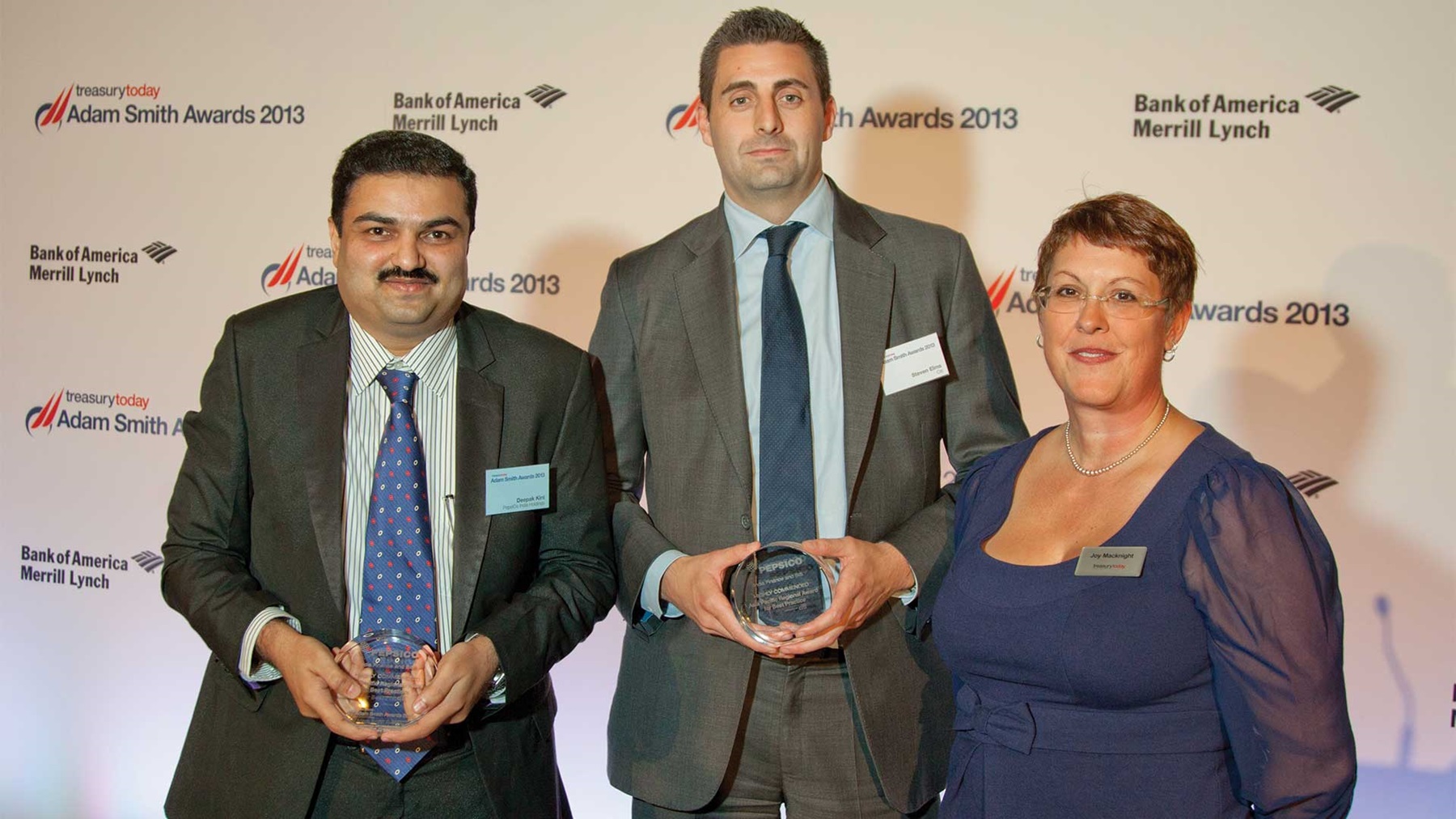
Photo of Deepak Kini, PepsiCo India Holdings, Steven Elms, Citi and Joy Macknight.
This is a single country re-engineering solution undertaken during a time of rapid expansion by the company in India. Read how PepsiCo achieved this through the establishment of a shared services centre (SSC) and host-to-host functionality.
Deepak Kini
Region Reporting and Shared Services Director, Haryana, India

PepsiCo is a global food and beverage leader with net revenues of more than $65 billion and a product portfolio that includes 22 brands that generate more than $1 billion each in annual retail sales. Our main businesses – Quaker, Tropicana, Gatorade, Frito-Lay and Pepsi-Cola – make hundreds of enjoyable foods and beverages.
in partnership with

India is expected to continue to be on the growth curve with most forecasts pegging GDP growths between 7-8% over the next five years. PepsiCo India Holdings Private Limited (PepsiCo) has grown into one of the largest and fastest growing food and beverage businesses in India.
PepsiCo worked with Citi on a re-engineering project which facilitated end-to-end seamless automation of receivables processing in a scalable and sustainable manner. Over the past 18 months, PepsiCo has realised benefits in terms of liquidity management, cash flow planning and transaction reporting in India, a market of high strategic importance for the company. PepsiCo senior management is benefiting from risk mitigation and improved compliance too. Significant administrative cost savings have also been realised, which has facilitated the reduction of 6,650 man hours once the accounting of all electronic transfers was centralised and then moved from a manual upload process to a host-to-host structure. Treasury has improved cash forecasting and fund planning, resulting in a reduction of bank charges by $120k.
Sales and marketing have seen the turnaround on deliveries reduce and working relationships with over 3,000 distributors have also been enhanced as a result of faster turnaround times and automated real-time alerts via email and SMS for payments. Migration of all non-core activities was moved to the shared services centre (SSC) to automate cash management processes and reduce the manual risks.
As Deepak Kini, Region Reporting and Shared Services Director states, “this solution had to be designed to address challenges specific to India, such as a predominantly paper-based economy, complex regulatory environment varying across states, vast geographical spread and cultural diversity.”
Implemented in a timeline of only one and a half years, the solution allowed PepsiCo to re-engineer its workflow processes, while also dramatically cutting costs. An innovator in introducing host-to-host functionality in India, the migration has resulted in the simplification of operations, standardisation of processes across the country and automation of the collection process.
The re-engineering strategy adopted by PepsiCo was an endeavour to improve treasury functions, working capital management and drive efficiencies in the business. This involved continually rethinking, automating or outsourcing numerous end-to-end steps from initiation of payment by the final consumer to reconciliation of the transaction in its global records.
As Kini describes: “We first moved the accounting centrally to PepsiCo’s SSC by requesting Citi to send the MIS only to the SSC. These transactions used to be accounted for manually at the SSC and the bank reconciliation was also manual. We then started getting files from Citi which used to get uploaded. To improve the process further, we moved the accounting of the transaction to a host-to-host structure. Within 60 minutes of the funds hitting PepsiCo’s account with Citi, the accounting entry in SAP is automatically passed and the goods can be shipped directly to the distributors.”
Bank reconciliation is now automated and since the accounting happens through an automatic bank feed, there are no open items in the reconciliation for all e-collect transactions. Citi designed the system architecture and data workflow where data travels in a secure environment between Citi and PepsiCo. An e-collect system with automatic remitter identification for the PepsiCo sales and finance team enables automatic reconciliation in SAP and the sending of confirmations of credit via SMS or email to dealers and distributors
Kini concludes: “The host-to-host migration has resulted in the simplification of operations, standardisation of processes across the country and across the beverages and foods businesses and automation of the collection process.”